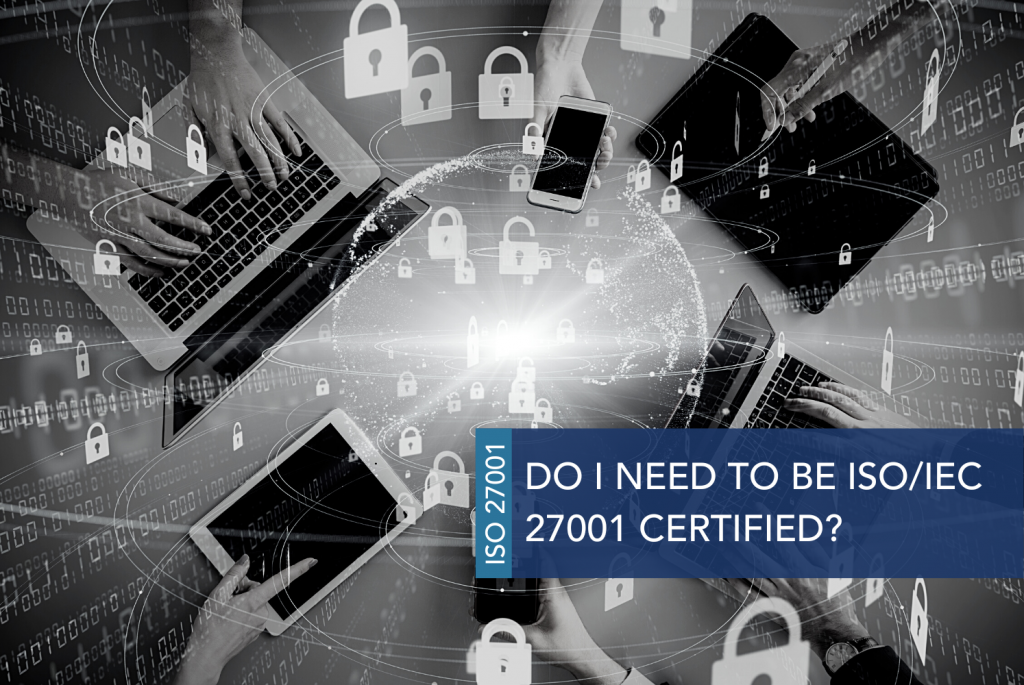
Do I need to be ISO/IEC 27001 certified?
September 13th, 2022 By AmywrightThe international standard for Information Security Management System (ISMS) is ISO/IEC 27001. The goal of ISO/IEC 27001 is to allow businesses to keep their information, whether it’s staff, customer, supplier data, or other information, secure from potential threats.
ISO/IEC 27001 requires organisational management to adhere to the following:
- Assess the company’s information security risks, taking account of threats, possible vulnerabilities, and influences
- Design and implement a set of information security controls to prevent risk to data
- Address risks that are regarded as unacceptable, and make an effective plan of action to counteract the threats
- Adopt an all-encompassing management process to guarantee that the information security controls continuously meet the organisation’s information security needs.
Why is ISO/IEC 27001 certification necessary?
According to a study by ICSID, over 90% of all small and medium businesses rely on digital tools for communication, meaning a large majority of companies use IT (information technology) as an integral part of their business. IT can be used for communication, storing files and data, internet services, marketing, security management, administration, software, and other uses.
The importance of technology means that there will be potential risks and hazards when protecting personal data. Businesses use technology to store important details about clients, suppliers, finances, contracts, bank details, passwords, and sensitive information, making it a target for threats. These risks make ISO/IEC 27001 a necessary asset to add value and security to your systems.
Digital threats can impact businesses of any size. Smaller companies must be more mindful and proactive when protecting their technology due to a lack of resources or money to counter cyber-attacks.
Our blog on preventing data interception and theft may interest you if you are a small business.
What does being ISO/IEC 27001 certified mean?
Having ISO/IEC 27001 means that your company’s operations are safe, secure, and potentially compliant with legal regulations. Certification allows clients and staff to feel confident and comfortable when interacting with your business. It gives you a competitive advantage compared to others in the market.
You can look to ensure your services are GDPR compliant, proving your business demonstrates the best practices in information security management. This will reduce the possibility of unauthorised access to data or unlawful use of information.
Why should I be ISO/IEC 27001 certified?
ISO/IEC 27001 gives organisations several advantages in conjunction with their security management system. Although protecting your organisation is one of the most significant benefits of this standard, multiple other benefits follow.
For one, your organisation could avoid penalties associated with non-compliance regarding data protection and GDPR. This can allow clients and suppliers to feel comfortable in knowing that the business they are interacting with is doing all it can to be protected and legally compliant. Clients can be assured that their information is safe with your business, and that you have a system in place to prevent a security breach.
This increase in the trust will give your company’s reputation a competitive advantage in your industry. Furthermore, as your reputation increases, you will be able to win new business opportunities among suppliers, clients, customers, and stakeholders.
Why is ISO/IEC 27001 important?
ISO/IEC 27001 is essential for maintaining any company’s information security management system. This system monitors the policies, procedures, processes, and techniques that oversee information security risks, such as cyber-attacks, data leaks and theft.
Threats can include:
- Viruses, worms, phishing attacks, and trojan horses
- Theft of intellectual property
- Identity theft
- Sabotage and hacking
- Theft of equipment or information
- Information extortion
Implementing an ISMS system will significantly reduce the probability of these threats occurring as specific processes will be set in place to ensure the safety of your security.
Is ISO/IEC 27001 mandatory?
Compliance with ISO/IEC 27001 is entirely optional and not mandatory. Many companies implement ISO/IEC 27001 to benefit from an information security management system (ISMS). These benefits help improve an organisation’s trust and reputation with clients and other interested parties. ISO/IEC 27001 is intended to protect your company and reputation from security threats but understands that each business will have its specific obligations for a compliant ISMS system.
Although it is not mandatory, there are some select countries and industries that require businesses to implement ISO/IEC 27001. These requirements are usually outlined in legal documents, contracts or service agreements. You should check and receive legal advice about the requirements you need for the country in which you operate your business.
One of the mandatory requirements for earning an ISO/IEC 27001 certification is the Statement of Applicability (SOA). The SOA is a detailed document stating what controls and policies are being applied to the organisation.
If you are interested in more, read our blog explaining the Statement of Applicability for ISO/IEC 27001.
I’m interested. How do I get certified?
If you are interested in earning ISO/IEC 27001 certification, you can contact IMSM and schedule a free consultation with one of our experts. At IMSM, we have a transparent fixed fee and flexible approach, helping you easily earn certification.
Already have ISO/IEC 27001? No problem! You can become certified to conduct internal audits as an ISO/IEC 27001 Internal Auditor through one of our live online training courses.
Contact Us
For a free Quotation or On-Site presentation by an ISO Specialist, contact us today!
IMSM New Zealand Ltd.
Level 33, 23-29 Albert Street,
Auckland Central,
Auckland -1010,
New Zealand
